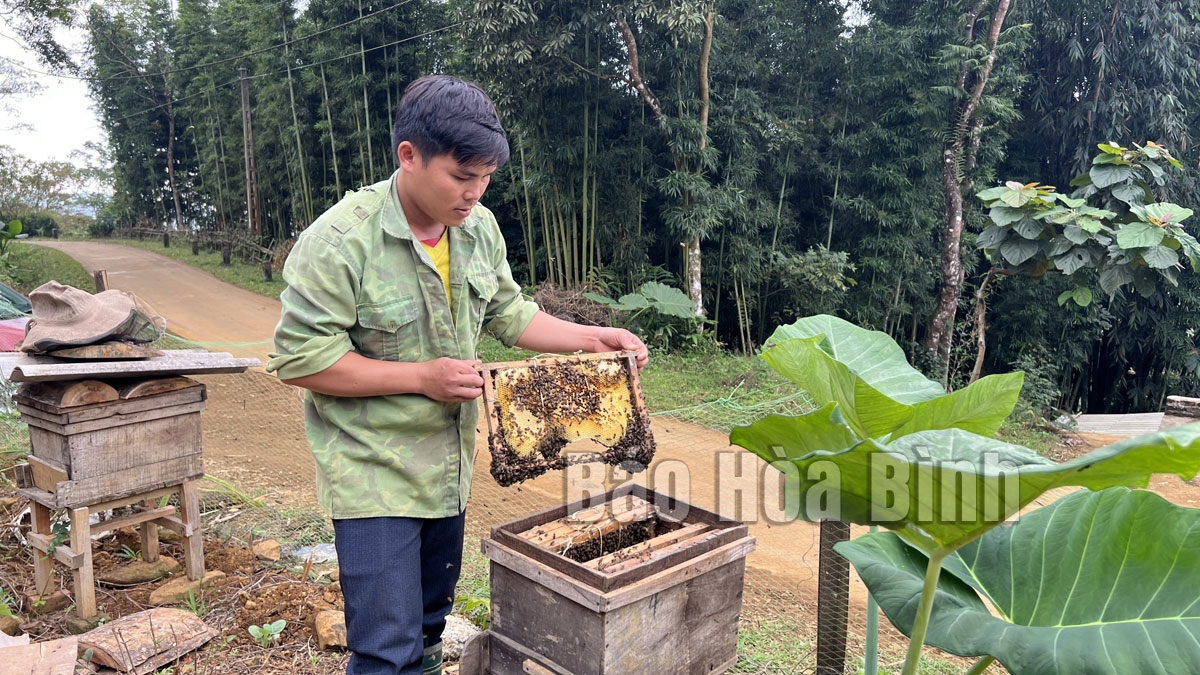



The model of beekeeping for honey by Mr. Bui Van Thieu from Thin hamlet, Mien Doi commune (Lac Son) gives an income of nearly 50 million VND a year.
Mr. Bui Manh Cuong, the Chairman of the Communal People's Committee says: "Realizing that beekeeping is suitable to the natural conditions and climate of the locality, the commune has been encouraging the local people to multiply herds in combination with the afforestation to create a source of abundant food for bees. With the low risk and the stable market for the product cómumption, the development and replication of the beekeeping model significantly contributes to the poverty reduction, improving the people's living standards.
Mr. Bui Van Thieu from Than hamlet has more than 8 years of working with beekeeping. Currently, his family has more than 40 herds of bees, each honey harvest they get nearly 4 quintals of honey, and traders often come to the house to buy in advance. Mr. Thieu says: "Over the years, drawing on experience from beekeeping and aiming to the clean products, the family's honey products are always purchased by the traders. With a selling price of 150,000 VND a liter, after excluding the costs, honey products bring in an income of nearly 50 million VND a year.
Beekeeping does not require a lot of capital investment, it does not take up human resources, and it provides a stable income, so a lo of people have switched to beekeeping. However, this profession requires the high technique and meticulousness in each stage, so not every household can follow it. Mr. Thieu adds: "For beekeeping, the most important thing is to choose a queen bee, if the queen bee is healthy, the bee herd grows and develops well, giving a high amount of honey. Taking advantage of an abundant food source, such as acacia flowers, longan ... the cost per bee herd is not significant. Besides, the disease prevention and control is also a top priority.”
Currently, in the whole Mien Doi commune there are 983 bee herds, concentrating in Than, Voi Thuong and Thuong Rieng hamlets. The households have applied the science and technology, producing according to the clean standards, so that the quality of honey is guaranteed, creating a brand and reputation in the market. Many households have boldly expanded the investment in beekeeping with hundreds of herds, bringing the significant economic benefits. Currently, Thuong Rieng village’s beekeeping cooperative for honey has 8 households with over 200 herds, so the competitiveness of the honey products in the market is increasingly enhanced. Every month, the cooperative group organizes the periodic meeting activities to discuss and exchange beekeeping experiences among the households in order to improve the product quality. The honey of the households in the commune is favored by the market because of its good quality and affordable price. The model shows that beekeeping is an effective economic development direction, creating the products of high quality, bringing the stable income for many households.
Being meticulous from the stage of care, taking honey, ensuring food hygiene and safety to creat a brand and improve the value of honey, with the goal of becoming an OCOP product, Mien Doi commune has been strengthening its promotion through the various social channels and networks, bringing the products closer to domestic and foreign markets, being known by many consumers. In addition to the product consumption in the district, the honey of the commune is also present in many agricultural and clean food stores outside the province.
From the high economic efficiency of beekeeping for honey, Mien Doi commune continues to mobilize the people to exploit the advantages of the forests and hills, increase herds of bees and apply science and technology in caring and developing bee herds, and exploiting the honey with other products; supporting channels to borrow capital for production, creating the livelihood and jobs, impriving the income for the local people. Currently, the per capita income of the whole commune is 36.5 million VND a year, and the poverty rate is 36.9%.